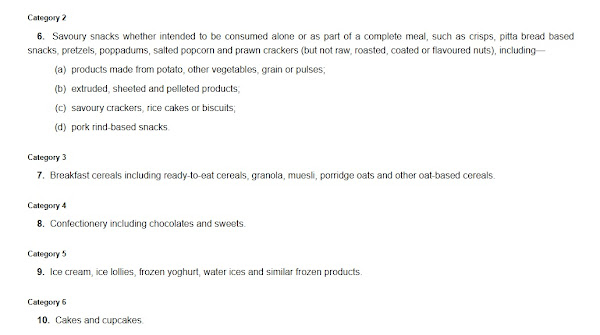Their press release makes extensive use of the meaningless term “junk food”, which can basically be taken to mean “any food items we disapprove of”. Perhaps people were expecting a ban on junk food adverts to apply only to the likes of pizzas, burgers and Wotsits but, unsurprisingly, the net has been drawn much more widely and encompasses many of what would be regarded as normal everyday foodstuffs. It’s rather like the disingenuous claim that Minimum Unit Pricing would only affect “cheap, high-strength alcohol”.
A taste of the scope of the restrictions is given by the except from the policy document shown above. Two particular examples that have received widespread media coverage are porridge and crumpets. Come on, you really didn’t think porridge was an unhealthy food, did you? Even Keir Starmer has been prompted to say that he doesn’t believe porridge is bad for children, but that isn’t going to stop him banning it from being advertised.
In any case, many of the items on the list are things that have no intrinsic appeal to children. You can’t really image a child pestering their parent for some M&S Seafood Linguine, but no, all advertising of ready meals will be banned, regardless of their nutritional content.
Christopher Snowdon has filleted the plans in his usual forensic style and points out that, even on the government’s own figures, they will result in the average child consuming a mere 2.3 calories less per day, which is neither here nor there. So, even taking the most charitable interpretation, it is a very heavy sledgehammer to crack a tiny nut. For some campaigners, though, it does not go far enough, and they object to companies being able to advertise at all if they sell any products that fall foul of the restrictions.
The ban on any form of paid online advertising is arguably far worse than the TV watershed rule, which by definition will only affect large companies. The internet is now integral to daily life, and will form a key part of many companies’ advertising strategy. Items such as cakes, chocolates, yoghurts and cooked meats may not be good for you if eaten in excessive quantities, but they are entirely legitimate products enjoyed by most adult consumers. Yet they are being treated as a “toxic trade” in a similar way to tobacco.
There is a coherent case for restricting advertising that is directly targeted at children, but surely it should be permissible to advertise legal products to adults. Advertising bans tend to result in ossification of the market they cover, with a reduction in competition, choice and innovation. They are bad news for consumers. Plus they will lead to a reduction in revenue for media organisations and could cause some of them financial difficulties.
When I started this blog seventeen years ago, I would have never expected that much of the fire of public health lobby would be diverted from alcohol to food, but that is how it has turned out. But there must be a strong chance of similar restrictions being applied to alcoholic drinks in the coming years. So don’t say you haven’t been warned!












Yes ! Look what has happened to tobacco with their plain packaging. Now most smokers buy from abroad and its much cheaper to !!!
ReplyDeleteMost people eat rubbish for breakfast. Cereal, toast, porridge, crumpets, croissants are all pretty much nutritionally empty. It's no wonder people start snacking at 10a.m.
ReplyDeleteEggs, meat, cheese, fruit...the full English is probably the healthiest our traditional options get, but of course they want us to move from meat on to insects.
Spinko,
DeleteThe Leader of the opposition says "I don’t think sandwiches are a real food, it’s what you have for breakfast” and "Lunch is for wimps".
Interesting times !
Kemi Badenough is Nigel's Christmas present come early.
DeleteStarmer&Co are the gift that keeps on giving to Reform month in month out.
Have a good Christmas Nige - you've earned it.
I think you misunderstand.
ReplyDeleteIt is only working class white refined sugar that must be banned.
There's nothing wrong with posh middle class sugar. Buy an expensive organic honey from Jamie's bee farm.
This new policy on restricting food advertising is definitely a bold move, though the term ‘junk food’ seems pretty vague and could impact a wide range of everyday products. It will be interesting to see how this plays out and what foods actually fall under these new rules. If you’re looking for a delicious snack or drink to enjoy while keeping up with these discussions, Wendy's coffee menu has some great options like Frosty-ccinos and lattes—perfect for a break!
ReplyDelete